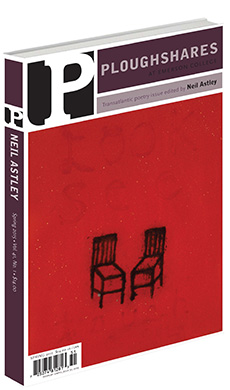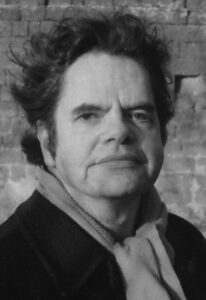About Neil Astley
Poets love a revolution. Many poets I met, in the years I spent running the Poetry Society in London, seemed to foster secret fantasies of living in a time when samizdat pamphlets, typed on hidden typewriters and smuggled to readers who treated them as if they were stone tablets, could change the world. Most poetry, as Auden pointed out, “makes nothing happen.” But there’s one man on the British poetry scene who seems to have changed a lot. You might even say that he has caused a revolution. He’s an extremely talented novelist, as well as a poet, but most of all he’s a publisher. His name is Neil Astley.
When Astley set up Bloodaxe Books, from a bedroom in Newcastle in 1978, he wanted to address the problem voiced by the poet Adrian Mitchell: that “Most people ignore most poetry / because / most poetry ignores most people.” Poetry publishers were, he has said, “narrow and out of touch with readers and writers at a grassroots level.” Most of the editors, and most of the poets they published, had been to Oxford or Cambridge and nearly all of them were men. Astley wanted to see a poetry scene that seemed more like the world outside publishers’ offices—a world that wasn’t, in fact, all pale, male, and stale. Thirty-seven years on, you can only say he’s done it. Bloodaxe has published more than 1,000 books and reached hundreds of thousands of new readers. It has published poets from different social and ethnic backgrounds, different parts of the country, and different parts of the world. Oh, and half the poets on the list are women.
As the son of an accountant growing up in suburban Hampshire, Astley wasn’t an obvious revolutionary. He was, he told me over a cup of coffee, obsessed with geography and geology. He dreamt of being a cartographer, and filled the attic with boxes of rocks. But signs of his later passion were there from the start. As a child, he used to borrow five books from the library a week. By the age of twelve, he had read everything in the children’s library. He was also writing stories and, like the Brontës, making his own little books. The first poetry book he actually bought was by Emily Dickinson. The second was the Liverpool poets’ famous anthology, The Mersey Sound. At eighteen, he went off to train as a journalist, but “dropped out halfway through and fled to Paris.” It was four years after the protests of ’68, and it opened his eyes to a different world.
What also changed his view of the world was something more dramatic. After a spell working as a press officer for Lyons ice cream, Astley got a job on the Northern Territory News in Australia. During a cyclone, which wiped out most of Darwin, he got trapped under the collapsed remains of a house. “You thought,” he told me, “you would die in the dark. Everything piled on top of you. All these loud thuds.” When he managed to crawl out of the wreckage, he felt that he had been given “a second life.” It made him, he said, “quite single-minded.” He got a place to read English at Newcastle, went back to England and worked as a bus conductor until he could start. He had, by the way, first discovered the city when he hitched a lift back from Edinburgh and was picked up by an escaped convict in a stolen car. Whatever else you can say about his life, it has clearly not been boring.
Newcastle in the seventies certainly wasn’t boring. It also had one of the liveliest poetry scenes in the UK. Through the poet and editor Jon Silkin, and his magazine Stand, Astley discovered the work of poets such as Geoffrey Hill, Roy Fisher, Hans Magnus Enzensberger, and Zbigniew Herbert. At poetry readings in a turret on the city walls called Morden Tower, he came across “agitprop, avant-garde, and pop poets,” as well as “highly respected literary elders.” He was soon publishing pamphlets by some of them, and helping Silkin with Stand. In the summer of 1978, he decided to set up his own press. His bank manager refused his request for an overdraft of £60, but he decided to go ahead anyway. Wanting a name that was “both memorable and distinctively northern,” he thought of the Viking king Eric Bloodaxe, the last ruler of the independent kingdom of Northumbria, and the most vibrant poetry list in Britain was born.
If it ever looked easy, it wasn’t. For the first few years, he was an unpaid one-man band, sleeping in a bedroom full of boxes. To pay the rent, he worked part-time in a bookshop, and “learned a great deal about how books sold.” In 1982, he got Arts Council funding, which he has had ever since. At the same time, his friend Simon Thirsk took financial control of the company. Thirsk’s “sound business judgment,” Astley says, “has been the right foil” for his editorial vision, and is probably what has kept the company afloat. The Arts Council grant is what has enabled them to take risks.
One of these was in 1986, with a collection called No, I’m Not Afraid, by a young poet called Irina Ratushinskaya. She was serving seven years’ hard labor in a Soviet prison camp, but some of her poems—originally written with burnt matchsticks on bars of soap—were memorized by fellow prisoners who would, if released, pass them on to her husband, Igor. In this way, they were slowly published. Astley read a few in a magazine, got more translated, and put them in a book. The British politician David Owen gave copies to Reagan and Gorbachev, and she was released on the eve of the Reykjavik summit. If that isn’t poetry making “things happen,” it’s hard to know what is.
Another risk was a book by the poet and playwright Tony Harrison, set during the miners’ strike, called V. When the theater director Richard Eyre made a TV film of it, he didn’t tone down Harrison’s extremely strong words. Tory politicians tried to stop it from being broadcast. The British tabloid the Daily Mail called it “a torrent of four-letter filth.” And sales soared.
Astley, it should now be clear, has a talent for publicity. He has also learned that anthologies are the poetry books that sell most. Over the years, he has published nearly fifty, and edited twenty of them himself. The most successful one, which came out in 2002, was called Staying Alive. Plastered with quotes by people like Mia Farrow, Jane Campion, and Philip Pullman, it was aimed at people who don’t usually read poetry, and hoped to show that it was “directly relevant to all our lives.” This, it turned out, was too much for the editors and critics Astley calls “the poetry police,” who wrote sneering pieces about “dumbing down.” When I reviewed it, for The Independent newspaper, I told readers to “go out and buy it for everyone you love.” More than 200,000 people did.
In the year Staying Alive came out, Astley published his first novel. It was crazily brilliant and extremely long. The End of My Tether was shortlisted for a major literary prize—the Whitbread, now the Costa—and hailed as “a classic of British political fiction.” It was followed in 2005 by an even more surreal second novel, The Sheep Who Changed the World. Without the demands of Bloodaxe, he could clearly have written much more. Does he, I asked, have any regrets about this? “I don’t think,” he told me, “I have an identity as a writer. With novels, you have to have an idea that can sustain writing something for a couple of years. I’ve only had two.”
His “creative energy,” he says, goes into the publishing. For Bloodaxe’s thirtieth anniversary, for example, it went into a DVD of poetry readings he produced with the filmmaker Pamela Robertson-Pearce, who in 2013, on a beach on Cape Cod, became his third wife. Producing it, he said in the introduction to the book that went with it, felt “almost like a revolutionary act.”
I’m not sure if a poetry DVD can count as a “revolutionary act.” I’m not sure how many Bloodaxe books will stand the test of time. Most books published by most publishers don’t. But I’m pretty damn sure of this: I’m pretty damn sure that Neil Astley—publisher, maverick, and maybe even missionary—has done a fair bit more for poetry than most poets.
Christina Patterson is a writer, columnist, and critic. She writes for The Sunday Times and The Guardian and blogs at christinapatterson.co.uk.

